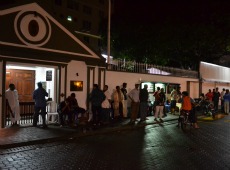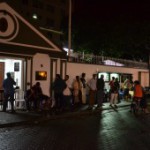The Ministry of Foreign Affairs has decided to hand back all Indian visa application operations to the Indian High Commission following a decline in visa requests, a Foreign Ministry spokesman has confirmed.
Last month Maldivians were forced to queue outside the Indian High Commission in Male’ – sometimes overnight – to obtain medical visas to travel to India due to tightened restrictions by Indian authorities.
To alleviate the issue, the Foreign Ministry launched an SMS system that alerted individuals when it was their turn to have their visas processed.
However, following a decline in visa requests this month, Maldivians wishing to obtain tokens for their Indian visas to be processed will now have to use the Indian High Commission building as before, as the Foreign Ministry is no longer providing the service.
A spokesman from the Ministry of Foreign Affairs told Minivan News that the decision to hand back full control of the visa process to the Indian High Commission was due to a “decline in visa requests”.
“During the school holidays there were more locals requesting visas to go to India, however the holidays are over now and the demand is less.
“Also, only 50 percent of the people we contacted by SMS to collect their visas from the high commission actually turned up,” the spokesman added.
Asked as to what would happen should the visa demand suddenly increase, the spokesperson assured the ministry would take measures to “ensure” all visas are processed
“If there is a requirement we will consult the Indian High Commission. It is currently issuing 53 tokens per day and we think that is working fine for now,” he said. “We will ensure that Maldivians will get their visas.”
 An official from within the Indian High Commission today confirmed that visa applications to India had decreased, noting that today there had been “less than 50” applicants.
An official from within the Indian High Commission today confirmed that visa applications to India had decreased, noting that today there had been “less than 50” applicants.
“The Foreign Ministry is only taking difficult cases now as the arrangement from December was only a temporary solution to deal with the circumstances,” he said.
The official admitted that there was a possibility for the queues to increase following the switch, however added “if there is a problem, we will try our best to find a solution to it.”
Visa restrictions
The High Commission has claimed that the tightened restrictions were in line with a bilateral agreement signed back in 1979 and its appropriation by Maldivian authorities in the intervening years.
A source within the Indian High Commission, speaking to Minivan News on December 29, 2012, contended that all visas given to Maldivians for travel to India were provided free of charge – a courtesy claimed to have not been extended to Indian citizens coming to the Maldives for work.
The commission spokesperson added that the introduction of the tighter regulations was imposed as a clear “signal” from Indian authorities that the concerns it had over practices in the Maldives such as the confiscation of passports of migrant workers, needed to be brought to an end.
On November 26 last year, a public notice had been issued by the Maldives Immigration Department requesting no employer in the country should be holding passports of expatriate workers.
The Maldives has come under strong criticism internationally in recent years over its record in trying to prevent people trafficking, with the country appearing on the US State Department’s Tier Two Watch List for Human Trafficking three years in a row.
The high commission also claimed this year that skilled expatriate workers from India, employed in the Maldives education sector, had continued to be “penalised” due to both government and private sector employers failing to fulfil their responsibilities.
 (0)Dislikes
(0)Dislikes (0)
(0)



